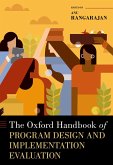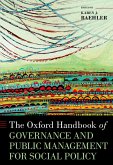The Oxford Handbook of Education and Globalization (eBook, ePUB)
Redaktion: Mattei, Paola; Behrend, Jacqueline; Mangez, Eric; Dumay, Xavier


Alle Infos zum eBook verschenken

The Oxford Handbook of Education and Globalization (eBook, ePUB)
Redaktion: Mattei, Paola; Behrend, Jacqueline; Mangez, Eric; Dumay, Xavier
- Format: ePub
- Merkliste
- Auf die Merkliste
- Bewerten Bewerten
- Teilen
- Produkt teilen
- Produkterinnerung
- Produkterinnerung

Hier können Sie sich einloggen

Bitte loggen Sie sich zunächst in Ihr Kundenkonto ein oder registrieren Sie sich bei bücher.de, um das eBook-Abo tolino select nutzen zu können.
Globalization has become one of the most recurrent concepts in social and political sciences. More often than not, however, the concept is handled without much of a properly articulated theory capable of explaining its historical origin and expansion. For education researchers attempting to elucidate how global changes and processes affect their field of study, this situation is problematic. The Oxford Handbook on Education and Globalization brings together in a unique way leading authors in social theory and in political science and reflects on how these two distinct disciplinary approaches…mehr
- Geräte: eReader
- mit Kopierschutz
- eBook Hilfe
- Größe: 23.08MB
![The Oxford Handbook of Program Design and Implementation Evaluation (eBook, ePUB) The Oxford Handbook of Program Design and Implementation Evaluation (eBook, ePUB)]() Anu RangarajanThe Oxford Handbook of Program Design and Implementation Evaluation (eBook, ePUB)79,95 €
Anu RangarajanThe Oxford Handbook of Program Design and Implementation Evaluation (eBook, ePUB)79,95 €![The School Services Sourcebook (eBook, ePUB) The School Services Sourcebook (eBook, ePUB)]() The School Services Sourcebook (eBook, ePUB)66,95 €
The School Services Sourcebook (eBook, ePUB)66,95 €![The Oxford Handbook of Sociology for Social Justice (eBook, ePUB) The Oxford Handbook of Sociology for Social Justice (eBook, ePUB)]() The Oxford Handbook of Sociology for Social Justice (eBook, ePUB)93,95 €
The Oxford Handbook of Sociology for Social Justice (eBook, ePUB)93,95 €![The Oxford Handbook of the Sociology of Disability (eBook, ePUB) The Oxford Handbook of the Sociology of Disability (eBook, ePUB)]() The Oxford Handbook of the Sociology of Disability (eBook, ePUB)102,95 €
The Oxford Handbook of the Sociology of Disability (eBook, ePUB)102,95 €![Children of the Welfare State (eBook, ePUB) Children of the Welfare State (eBook, ePUB)]() Laura GilliamChildren of the Welfare State (eBook, ePUB)31,95 €
Laura GilliamChildren of the Welfare State (eBook, ePUB)31,95 €![The Investment State (eBook, ePUB) The Investment State (eBook, ePUB)]() David StoeszThe Investment State (eBook, ePUB)20,95 €
David StoeszThe Investment State (eBook, ePUB)20,95 €![The Oxford Handbook of Governance and Public Management for Social Policy (eBook, ePUB) The Oxford Handbook of Governance and Public Management for Social Policy (eBook, ePUB)]() The Oxford Handbook of Governance and Public Management for Social Policy (eBook, ePUB)79,95 €
The Oxford Handbook of Governance and Public Management for Social Policy (eBook, ePUB)79,95 €-
-
-
Dieser Download kann aus rechtlichen Gründen nur mit Rechnungsadresse in A, B, BG, CY, CZ, D, DK, EW, E, FIN, F, GR, HR, H, IRL, I, LT, L, LR, M, NL, PL, P, R, S, SLO, SK ausgeliefert werden.
- Produktdetails
- Verlag: OUP eBook
- Erscheinungstermin: 13. Oktober 2023
- Englisch
- ISBN-13: 9780197570708
- Artikelnr.: 69095194
- Verlag: OUP eBook
- Erscheinungstermin: 13. Oktober 2023
- Englisch
- ISBN-13: 9780197570708
- Artikelnr.: 69095194
- Herstellerkennzeichnung Die Herstellerinformationen sind derzeit nicht verfügbar.
Comparative Politics
* PART I: Social Theory, Globalization, and Education
* Introduction to Part I: Social Theory, Globalization, and Education
* SECTION I: Culture, Globalization, and Education
* Chapter 1: Globalization of Nation-States and National Education
Projects
* Chapter 2: An Anthropological Perspective on Globalization and
Schooling
* Chapter 3: Historical Institutionalism in Education and Globalization
* Chapter 4: Education in a Post-Liberal World Society
* Chapter 5: World Culture, Education, and Organization
* Chapter 6: Globalization, New Institutionalisms, and the Political
Dimension
* Chapter 7: Globalization, Cultural Logics, and the Teaching
Profession
* Chapter 8: Higher Education and Organizational Theory: Systems,
Fields, Markets, and Populations in an Increasingly Global Context
* SECTION II: Structural Approaches to Globalization in Education
* Chapter 9: The Globalisation of Expertise? Epistemic Governance,
Quantification, and the Consultocracy
* Chapter 10: Globalization, Personalization, and the Learning
Apparatus
* Chapter 11: Field Theory Beyond the Nation State
* Chapter 12: Inclusive Education, Globalization, and New Philosophical
Perspectives on Social Justice
* Chapter 13: Globalization, uncertainty and the returns to education
over the life course in modern societies
* Chapter 14: Globalization of Education and the Sociology of Elites
* Chapter 15: Mobilizing Whiteness: Race, Futurity, and Globalization
of Higher Education
* SECTION III: Systems Theory, Globalization, and Education
* Chapter 16: Education in a Functionally Differentiated World Society
* Chapter 17: Education Reform as a Global Phenomenon
* Chapter 18: The Rats under the Rug: The Morphogenesis of Education in
a Global Context
* Chapter 19: Redrawing what Counts as Education: The Impact of the
Global Early Childhood Education Program on German Kindergarten
* Chapter 20: The University as a World Organization
* Chapter 21: Small Worlds: Homeschooling and the Modern Family
* PART II: Policy Challenges and Implications of Global Pressures on
National Education Systems
* Introduction: Global, National, and Local Scales of Governance in
Education Policy
* SECTION IV: International Organizations and Education Policy
* Chapter 22: The Expansion of Education in and Across International
Organizations
* Chapter 23: The OECD's Boundary Work in Education in the United
States and Brazil: A Historical Comparative Analysis of Two Federal
States
* Chapter 24: Playing God: Education Data Visualizations and the Art of
World-Making
* SECTION V: The Responses of National Education Systems to Global
Pressures
* Chapter 25: The PISA Pendulum: Political Discourse and Education
Reform in the Age of Global Reference Societies
* Chapter 26: Why Globalization Hardly Affects Education Systems: A
Historical Institutionalist View
* Chapter 27: Policy Advice and Policy Advisory Systems in Education
* Chapter 28: The Formation and Development of a Norwegian
Accountability System
* SECTION VI: The Massification of Secondary Education
* Chapter 29: Diffusion of Mass Education: Pathways to Isomorphism
* Chapter 30: The Politics of Equality in Secondary Education Across
Wealthy Post-War Democracies
* Chapter 31: Examining the Impact of Educational Reforms on Schooling
and Competences in PIAAC
* Chapter 32: Educational Expansion and Inequality: School in Italy in
the Second Part of the XX Century
* SECTION VII: Globalization of Higher Education and Science
* Chapter 33: Can Non-Western Countries Escape from Catch-up Modernity?
The Troubling Case of Japan's Education Reforms in a Global Era
* Chapter 34: The Global Scale in Higher Education and Research
* Chapter 35: The Globalization of Science: The Increasing Power of
Individual Scientists
* Chapter 36: China's Responses to Globalization and Higher Education
Reforms: Challenges and Policy Implications
* Chapter 37: On Reforming Higher Education in India
* Chapter 38: The Rehabilitation of the Concept of Public Good:
Reappraising the Attacks from Liberalism and Neo-Liberalism from a
Poststructuralist Perspective
* SECTION VIII: Latin America
* Chapter 39: Educational Challenges in Latin America: An Outline from
Conquest to COVID
* Chapter 40: Technocrats and Unions in the Politics of Reforming
Teacher Careers in Colombia and Peru
* Chapter 41: Subnational Variations in Education and Policy Innovation
in Argentina
* Chapter 42: Economic Globalization and Evolution of Education
Spending in the Brazilian Federation 2013-2019
* Chapter 43: Does Globalization Reward Education? Evidence from Mexico
* Chapter 44: Factious Education Politics in Chile 1981-2021: Enduring
Contention over Privatization, Inequality, and Quality
Comparative Politics
* PART I: Social Theory, Globalization, and Education
* Introduction to Part I: Social Theory, Globalization, and Education
* SECTION I: Culture, Globalization, and Education
* Chapter 1: Globalization of Nation-States and National Education
Projects
* Chapter 2: An Anthropological Perspective on Globalization and
Schooling
* Chapter 3: Historical Institutionalism in Education and Globalization
* Chapter 4: Education in a Post-Liberal World Society
* Chapter 5: World Culture, Education, and Organization
* Chapter 6: Globalization, New Institutionalisms, and the Political
Dimension
* Chapter 7: Globalization, Cultural Logics, and the Teaching
Profession
* Chapter 8: Higher Education and Organizational Theory: Systems,
Fields, Markets, and Populations in an Increasingly Global Context
* SECTION II: Structural Approaches to Globalization in Education
* Chapter 9: The Globalisation of Expertise? Epistemic Governance,
Quantification, and the Consultocracy
* Chapter 10: Globalization, Personalization, and the Learning
Apparatus
* Chapter 11: Field Theory Beyond the Nation State
* Chapter 12: Inclusive Education, Globalization, and New Philosophical
Perspectives on Social Justice
* Chapter 13: Globalization, uncertainty and the returns to education
over the life course in modern societies
* Chapter 14: Globalization of Education and the Sociology of Elites
* Chapter 15: Mobilizing Whiteness: Race, Futurity, and Globalization
of Higher Education
* SECTION III: Systems Theory, Globalization, and Education
* Chapter 16: Education in a Functionally Differentiated World Society
* Chapter 17: Education Reform as a Global Phenomenon
* Chapter 18: The Rats under the Rug: The Morphogenesis of Education in
a Global Context
* Chapter 19: Redrawing what Counts as Education: The Impact of the
Global Early Childhood Education Program on German Kindergarten
* Chapter 20: The University as a World Organization
* Chapter 21: Small Worlds: Homeschooling and the Modern Family
* PART II: Policy Challenges and Implications of Global Pressures on
National Education Systems
* Introduction: Global, National, and Local Scales of Governance in
Education Policy
* SECTION IV: International Organizations and Education Policy
* Chapter 22: The Expansion of Education in and Across International
Organizations
* Chapter 23: The OECD's Boundary Work in Education in the United
States and Brazil: A Historical Comparative Analysis of Two Federal
States
* Chapter 24: Playing God: Education Data Visualizations and the Art of
World-Making
* SECTION V: The Responses of National Education Systems to Global
Pressures
* Chapter 25: The PISA Pendulum: Political Discourse and Education
Reform in the Age of Global Reference Societies
* Chapter 26: Why Globalization Hardly Affects Education Systems: A
Historical Institutionalist View
* Chapter 27: Policy Advice and Policy Advisory Systems in Education
* Chapter 28: The Formation and Development of a Norwegian
Accountability System
* SECTION VI: The Massification of Secondary Education
* Chapter 29: Diffusion of Mass Education: Pathways to Isomorphism
* Chapter 30: The Politics of Equality in Secondary Education Across
Wealthy Post-War Democracies
* Chapter 31: Examining the Impact of Educational Reforms on Schooling
and Competences in PIAAC
* Chapter 32: Educational Expansion and Inequality: School in Italy in
the Second Part of the XX Century
* SECTION VII: Globalization of Higher Education and Science
* Chapter 33: Can Non-Western Countries Escape from Catch-up Modernity?
The Troubling Case of Japan's Education Reforms in a Global Era
* Chapter 34: The Global Scale in Higher Education and Research
* Chapter 35: The Globalization of Science: The Increasing Power of
Individual Scientists
* Chapter 36: China's Responses to Globalization and Higher Education
Reforms: Challenges and Policy Implications
* Chapter 37: On Reforming Higher Education in India
* Chapter 38: The Rehabilitation of the Concept of Public Good:
Reappraising the Attacks from Liberalism and Neo-Liberalism from a
Poststructuralist Perspective
* SECTION VIII: Latin America
* Chapter 39: Educational Challenges in Latin America: An Outline from
Conquest to COVID
* Chapter 40: Technocrats and Unions in the Politics of Reforming
Teacher Careers in Colombia and Peru
* Chapter 41: Subnational Variations in Education and Policy Innovation
in Argentina
* Chapter 42: Economic Globalization and Evolution of Education
Spending in the Brazilian Federation 2013-2019
* Chapter 43: Does Globalization Reward Education? Evidence from Mexico
* Chapter 44: Factious Education Politics in Chile 1981-2021: Enduring
Contention over Privatization, Inequality, and Quality







